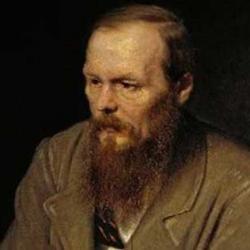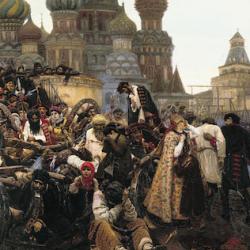Stepan Trofimovich, the vain Francophone liberal in Dostoevsky’s Demons, claims to know the gospels well from reading Renan, but in fact hasn’t read the Bible itself in a long time.
During an illness, he comes to see himself as the liar he is and asks Sophia to read the gospels to him. He chooses to commit the story of the Gadarene demoniac to memory, ultimately concluding that though he had been the “head” of the devils, the miracle gave him hope that he could be delivered.
Diane Thompson (Dostoevsky and the Christian Tradition) notes that this moment of self-illumination and repentance is reinforced by a nice symbolic touch: “When Stepan first enters the room where he is soon to
die, the narrator appends a seemingly casual remark: `he didn’t even
look out the window at the huge lake’ close by the hut . . . . With
this extraordinary lacuna in Stepan’s visual field, the author symbolically
conveys his blindness to spiritual truths, to everything but
himself, his ideas, his wish to impress Sophia. Shortly after his
interpretation of the passage from Luke, Stepan sinks into a delirium
which faintly mimics the ravings of the demoniac. On the morning
of `the third day’ he wakes in his full mind and suddenly `wants to
look out the window’; he marvels: `Tiens, un lac! ± ah, my God, I
hadn’t seen it before’ . . . . Across the lake lies Spasov, a name
bound to remind the Russian reader of Spas (the Saviour). The `third
day’ in this context is reminiscent of the Resurrection, and the lake
which has to be crossed to reach Spasov is symbolic of a journey of
purification. Thus, the lake in the Gospel and the lake outside a
nineteenth-century Russian peasant hut here come together in a
similarity relationship of poetry. On the threshold of leaving this
world, there opens up for Stepan Trofimovich a prospect to Spasov,
to the Saviour. `[T]out le monde va a Spasov’, exclaimed Stepan
earlier. . . . This is the destination to which Dostoevsky hoped
Russia, and perhaps all humanity, were making a pilgrimage” (79).










